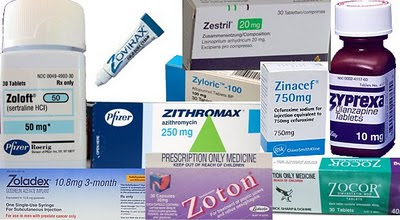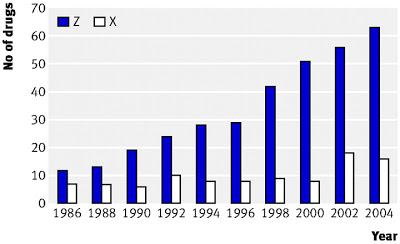Neuroscience

Freelance medical and science writer Rob Stepney noticed the rapid growth of "x" and "z"-named products included in the British National Formulary (BNF). So for the Christmas 2010 issue of BMJ (Stepney, 2010), he investigated this phenomenon:
Instead, he speculates that x and z might have been perceived as making products stand out in a crowd:

Fig 1 (Stepney, 2010). Number of drugs with a brand name beginning with z or x listed in March edition of BNF for each year. New formulations of existing brands and zinc related compounds have been excluded.
For instance, the August 9, 2007 newsletter from the Institute for Safe Medication Practices discusses Progress with preventing name confusion errors and links to a document on the most problematic look-alike and sound-alike drug names of 2006-2007 (PDF). These include:
Reference
Stepney, R. (2010). A dose by any other name would not sell as sweet. BMJ, 341:c6895 DOI: 10.1136/bmj.c6895
- Brands Leave Their Mark On Children's Brains
The idea may be "unpalatable", but companies seeking an edge over their rivals should ensure that children are exposed to their brands as early in life as possible. That's according to Andrew Ellis and colleagues, whose new research shows that the...
- Sex Doesn't Sell
The late Mary Whitehouse, famed campaigner for traditional morals and decency, would have approved of this new study by Brad Bushman at the University of Michigan showing that adverts embedded in violent and/or sexual TV programmes are less effective...
- Neuropsychology Abstract Of The Day: Cognitive Enhancement
Outram SM. The use of methylphenidate among students: The future of enhancement? Journal of Medical Ethics. 2010 Apr, 36(4), 198-202. Novel Tech Ethics, Dalhousie University, 1234 LeMarchant Street, Halifax NS B3H 3P7, Canada. During the past few years...
- Antipsychotic Medications
The new issue of the Canadian Medical Association Journal includes a review article of modern and older antipsychotic medications. The article is available in free, full-content format. David M. Gardner, Ross J. Baldessarini, and Paul Waraich. Modern...
- Business World: Guilford Pharm's Gliadel
A company press release regarding a treatment for brain tumors: Guilford Pharmaceuticals Announces Orphan Drug Designation for GLIADEL(R) Wafer; Market Exclusivity for GLIADEL(R) Extends Until 2010 BALTIMORE, Sept. 27 /PRNewswire-FirstCall/ -- Guilford...
Neuroscience
Why are the letters "z" and "x" so popular in drug names?

Freelance medical and science writer Rob Stepney noticed the rapid growth of "x" and "z"-named products included in the British National Formulary (BNF). So for the Christmas 2010 issue of BMJ (Stepney, 2010), he investigated this phenomenon:
Of 1436 products added to the BNF between 1986 and 2005, more than a fifth had names that began with z or x or contained a prominent x or z within them. In 1986, only 19 branded drugs began with one of these letters. Over the next two decades, the number of brands beginning with a z increased by more than 400% (to 63) and those beginning with an x increased by 130% (to 16). In the same period, the overall content of the BNF grew by only 80%.Why did it happen? He first asks whether use of the voiced fricative “zuh” sound might be special in some way, but he quickly dismisses this possibility, along with the popularity of z in the Middle East.
Instead, he speculates that x and z might have been perceived as making products stand out in a crowd:
Reflecting their infrequent occurrence in English words, x and z count for 8 and 10 points in Scrabble, the highest values (along with j and q) in the game. So names that contain them are likely to seem special and be memorable. “If you meet them in running text, they stand out,” is the way one industry insider explained. Generally, they are also easy to pronounce.In my view, however, the rush to uniqueness resulted in an overcrowded field. The market became saturated with X and Z brand names, which can cause confusion.

Fig 1 (Stepney, 2010). Number of drugs with a brand name beginning with z or x listed in March edition of BNF for each year. New formulations of existing brands and zinc related compounds have been excluded.
For instance, the August 9, 2007 newsletter from the Institute for Safe Medication Practices discusses Progress with preventing name confusion errors and links to a document on the most problematic look-alike and sound-alike drug names of 2006-2007 (PDF). These include:
ZYPREXA (olanzapine) and ZYRTEC (cetirizine)Other frequently confused Z/X pairs:
Name similarity has resulted in frequent mixups between Zyrtec, an antihistamine, and Zyprexa, an antipsychotic. Patients who receive Zyprexa in error have reported dizziness, sometimes leading to a related injury from a fall. Patients on Zyprexa for a mental illness have relapsed when given Zyrtec in error.
Zantac – XanaxAt any rate, here's Stepney's (2010) conclusion:
Zantac – Zyrtec
Zestril – Zyprexa
Zestril – Zetia
Zocor – Zyrtec
I suggest that this phenomenon arose because of the fast rate at which new products were being introduced, the fact that the difference between many “me too” drugs was more apparent than real, the immense rewards that were seen to accrue from innovative marketing, and the fact that the ploys available for use in the naming of drugs are so restricted.A full list of the drugs mentioned in the article can be viewed here.
Reference
Stepney, R. (2010). A dose by any other name would not sell as sweet. BMJ, 341:c6895 DOI: 10.1136/bmj.c6895
- Brands Leave Their Mark On Children's Brains
The idea may be "unpalatable", but companies seeking an edge over their rivals should ensure that children are exposed to their brands as early in life as possible. That's according to Andrew Ellis and colleagues, whose new research shows that the...
- Sex Doesn't Sell
The late Mary Whitehouse, famed campaigner for traditional morals and decency, would have approved of this new study by Brad Bushman at the University of Michigan showing that adverts embedded in violent and/or sexual TV programmes are less effective...
- Neuropsychology Abstract Of The Day: Cognitive Enhancement
Outram SM. The use of methylphenidate among students: The future of enhancement? Journal of Medical Ethics. 2010 Apr, 36(4), 198-202. Novel Tech Ethics, Dalhousie University, 1234 LeMarchant Street, Halifax NS B3H 3P7, Canada. During the past few years...
- Antipsychotic Medications
The new issue of the Canadian Medical Association Journal includes a review article of modern and older antipsychotic medications. The article is available in free, full-content format. David M. Gardner, Ross J. Baldessarini, and Paul Waraich. Modern...
- Business World: Guilford Pharm's Gliadel
A company press release regarding a treatment for brain tumors: Guilford Pharmaceuticals Announces Orphan Drug Designation for GLIADEL(R) Wafer; Market Exclusivity for GLIADEL(R) Extends Until 2010 BALTIMORE, Sept. 27 /PRNewswire-FirstCall/ -- Guilford...
